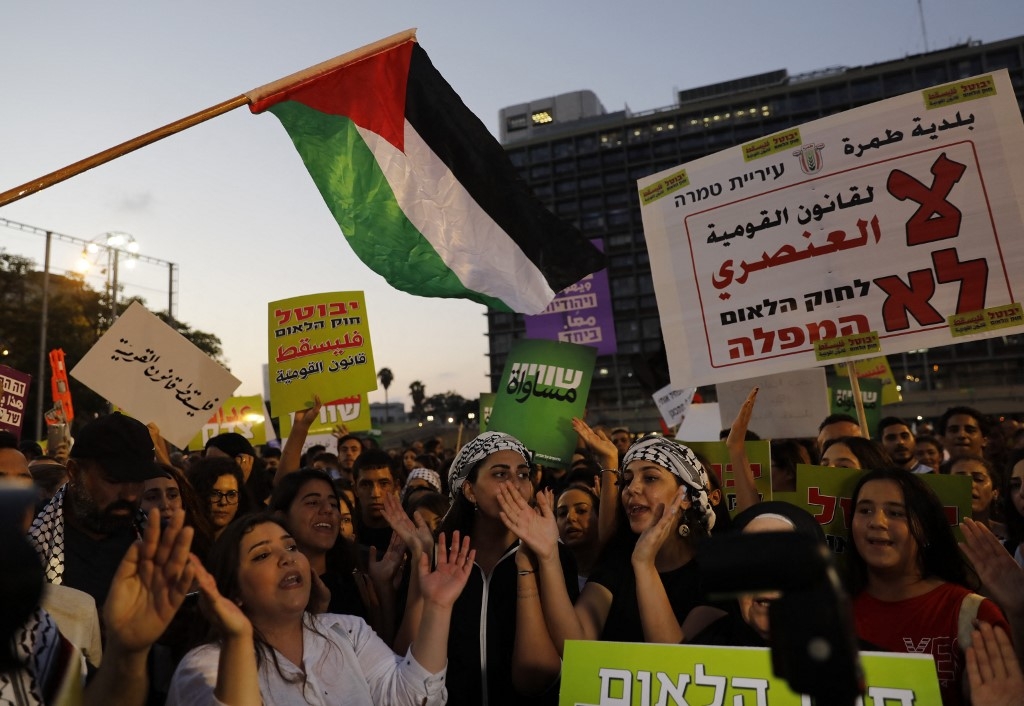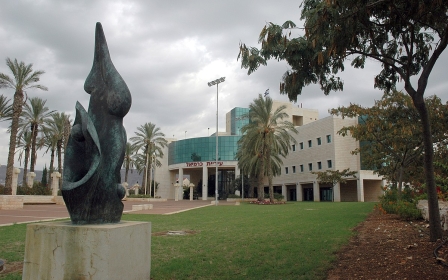Israel: Palestinian citizens denounce approval of Jewish nation-state law

Palestinian citizens of Israel lambasted the Supreme Court over its decision on Thursday to uphold the quasi-constitutional nation-state law, which gives Jews supremacy over all non-Jewish Israeli citizens.
The nation-state law, which passed amid Palestinian protests in 2018, states that Israel is "the national home of the Jewish people" and the "right to exercise national self-determination in the State of Israel is unique to the Jewish people".
Less than 500 words long, the law also gives Hebrew superior status over Arabic and encourages the expansion of "Jewish settlement as a national value".
On Thursday, Israel's Supreme Court rejected 15 petitions filed by a plethora of rights groups, individuals and political parties, including Meretz; the Arab Joint List; Adalah; the Association for Civil Rights in Israel; the mayor of Baqa al-Gharbiyye, Morsi Abu Moch, and legal representatives of the Druze community, among others.
They have asked the Supreme Court to nullify the controversial nation-state law or remove some of its clauses to ensure equality for Palestinian and Druze citizens of Israel and residents who are not Jews.
New MEE newsletter: Jerusalem Dispatch
Sign up to get the latest insights and analysis on Israel-Palestine, alongside Turkey Unpacked and other MEE newsletters
In December, the court hinted that the law could be interpreted, but avoided discussing it during the hearing of the petitions. But on Thursday, the judges approved the nation-state law, writing that it "is a chapter in [Israel's] emerging constitution, which is intended to anchor the components of the state's identity as a Jewish state".
Supreme Court judges added that although the nation-state law does not explicitly enshrine equality in the law, its exclusion "ultimately does not detract from its status and importance as a fundamental principle in our doctrine".
In a statement, the Adalah legal centre, representing Palestinians inside Israel, said that the law "enshrines Jewish supremacy and racial segregation as foundational principles of the State of Israel," adding that the only dissenting opinion out of the 10 judges in the Supreme Court was from George Karra, a Palestinian citizen of Israel from the Druze community.
Karra wrote that the law "intensifies the violation of the principle of equality" against Palestinian citizens of Israel and the Druze and that it "denies the core of the democratic identity of the state".
Adalah said that the Supreme Court has established "a constitutional identity" of Israel by approving the Jewish nation-state law, "which completely excludes those who do not belong to the majority group".
It denounced the Supreme Court, saying that it "has not protected Palestinians from the most racist laws in the world since World War II and the fall of the apartheid regime in South Africa".
'No court can legitimise a racist law'
Ayman Odeh, the head of the Joint List political alliance, criticised the court's decision as "racist and anti-democratic".
"The Jewish supremacy law received a stamp of approval today from the Supreme Court ... But this is our homeland and no ruling will change that," Odeh said on Thursday.
Gideon Saar, the justice minister, welcomed the court's decision, saying that the law "anchors the Jewish essence and character of Israel as the nation-state of the Jewish people".
Ayelet Shaked, the interior minister, also welcomed the decision, but said the court should have never agreed to hear the petitions. Shaked was an advocate of the nation-state law in 2018 when she was justice minister.
Yousef Jabareen, of the Joint List, condemned the nation-state law, saying that it "further marginalises the Arab-Palestinian community and entrenches Israel's regime of racial discrimination and deterioration into apartheid.
"It will lead to more racist, anti-democratic laws, adding to the more than 50 laws already on the books that disadvantage non-Jewish citizens," he said.
Ofer Cassif, the only Israeli Jewish Knesset member on the Joint List, said that "no court can legitimise a racist law".
Middle East Eye delivers independent and unrivalled coverage and analysis of the Middle East, North Africa and beyond. To learn more about republishing this content and the associated fees, please fill out this form. More about MEE can be found here.






